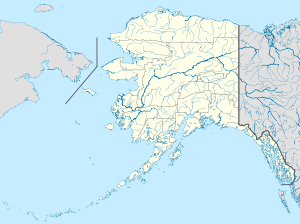Kotlik, Alaska
| Kotlik Qerrulliik | |
|---|---|
| City | |
 Kotlik Location in Alaska | |
| Coordinates: 63°2′9″N 163°33′37″W / 63.03583°N 163.56028°WCoordinates: 63°2′9″N 163°33′37″W / 63.03583°N 163.56028°W | |
| Country | United States |
| State | Alaska |
| Census Area | Kusilvak |
| Incorporated | October 28, 1970[1] |
| Government | |
| • Mayor | Mary Ann Mike |
| • State senator | Donny Olson (D) |
| • State rep. | Neal Foster (D) |
| Area | |
| • Total | 4.7 sq mi (12.0 km2) |
| • Land | 3.8 sq mi (9.9 km2) |
| • Water | 0.8 sq mi (2.2 km2) |
| Elevation | 0 ft (0 m) |
| Population (2007)[2] | |
| • Total | 641 |
| • Density | 154.8/sq mi (59.7/km2) |
| Time zone | Alaska (AKST) (UTC-9) |
| • Summer (DST) | AKDT (UTC-8) |
| Zip code | 99620 |
| Area code | 907 |
| FIPS code | 02-41720 |
Kotlik (Qerrulliik in Central Yup'ik) is a city in Kusilvak Census Area, Alaska, United States. At the 2000 census the population was 591.
Geography
Kotlik is located at 63°02′09″N 163°33′37″W / 63.035769°N 163.560177°W.[3] Kotlik is located on the east bank of the Kotlik Slough, 35 miles northeast of Emmonak in the Yukon-Kuskokwim Delta.
According to the United States Census Bureau, the city has a total area of 4.7 square miles (12 km2), of which, 3.8 square miles (9.8 km2) of it is land and 0.8 square miles (2.1 km2) of it (17.85%) is water. The climate of Kotlik is subarctic. Temperatures range between -50 and 87. There is an average of 60 inches of snowfall and 16 inches of precipitation annually.
Demographics
| Historical population | |||
|---|---|---|---|
| Census | Pop. | %± | |
| 1920 | 83 | — | |
| 1930 | 14 | −83.1% | |
| 1940 | 35 | 150.0% | |
| 1950 | 44 | 25.7% | |
| 1960 | 57 | 29.5% | |
| 1980 | 293 | — | |
| 1990 | 461 | 57.3% | |
| 2000 | 591 | 28.2% | |
| 2010 | 577 | −2.4% | |
| Est. 2015 | 626 | [4] | 8.5% |
As of the census[6] of 2000, there were 591 people, 117 households, and 102 families residing in the city. The population density was 154.8 people per square mile (59.7/km²). There were 139 housing units at an average density of 36.4 per square mile (14.0/km²). The racial makeup of the city was 3.55% White, 93.57% Native American, and 2.88% from two or more races. 0.34% of the population were Hispanic or Latino of any race.
There were 117 households out of which 70.1% had children under the age of 18 living with them, 65.0% were married couples living together, 11.1% had a female householder with no husband present, and 12.8% were non-families. 10.3% of all households were made up of individuals and 3.4% had someone living alone who was 65 years of age or older. The average household size was 5.05 and the average family size was 5.48.
In the city the age distribution of the population shows 48.2% under the age of 18, 11.2% from 18 to 24, 24.9% from 25 to 44, 12.0% from 45 to 64, and 3.7% who were 65 years of age or older. The median age was 18 years. For every 100 females there were 114.1 males. For every 100 females age 18 and over, there were 109.6 males.
The median income for a household in the city was $37,750, and the median income for a family was $37,969. Males had a median income of $29,583 versus $16,875 for females. The per capita income for the city was $7,707. About 18.4% of families and 21.1% of the population were below the poverty line, including 21.8% of those under age 18 and 25.9% of those age 65 or over.
References
- ↑ 1996 Alaska Municipal Officials Directory. Juneau: Alaska Municipal League/Alaska Department of Community and Regional Affairs. January 1996. p. 85.
- ↑ "Annual Estimates of the Population for Incorporated Places in Alaska". United States Census Bureau. 2008-07-10. Retrieved 2008-07-14.
- ↑ "US Gazetteer files: 2010, 2000, and 1990". United States Census Bureau. 2011-02-12. Retrieved 2011-04-23.
- ↑ "Annual Estimates of the Resident Population for Incorporated Places: April 1, 2010 to July 1, 2015". Retrieved July 2, 2016.
- ↑ "Census of Population and Housing". Census.gov. Retrieved June 4, 2015.
- ↑ "American FactFinder". United States Census Bureau. Retrieved 2008-01-31.
